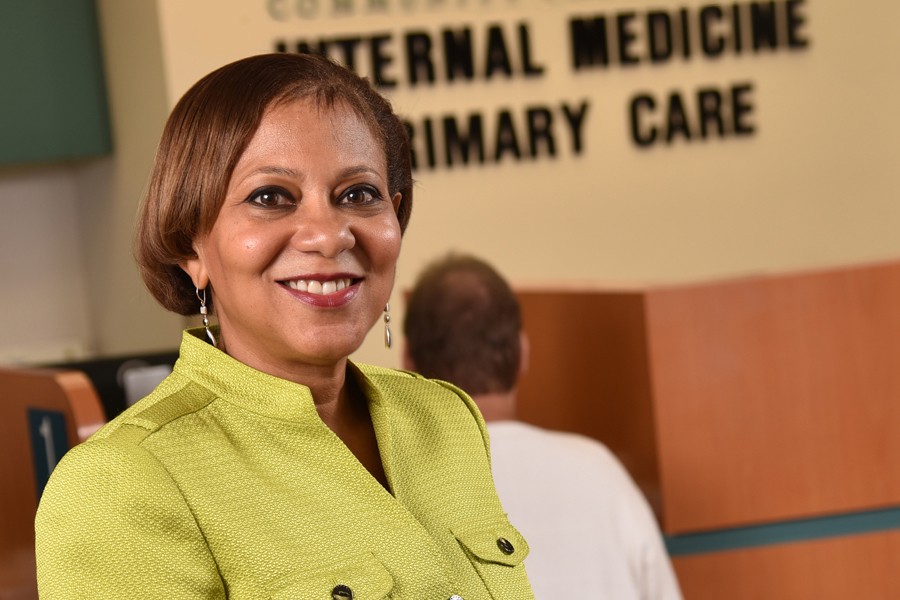At the start of her medical career, Lisa Cooper saw some recurring themes with patients she worked with in Baltimore. For many, it seemed that the root of chronic illnesses like diabetes and hypertension lay less in actual medical conditions and more in their socioeconomic statuses—and the resulting stresses of their lifestyles.
"They would tell me about all of their other problems and struggles, and I felt so overwhelmed," Cooper says. "I thought, 'What can I do about all of this?'"
These types of questions have dominated Cooper's work. As the James F. Fries Professor of general internal medicine at Johns Hopkins, she has focused on America's health disparities—the ways race and socioeconomic factors shape them, and the ways our health systems might help eliminate them.
Now, with her new appointment as a Bloomberg Distinguished Professor at Johns Hopkins University, Cooper gets to take that work to the next level.
The new role allows Cooper to pursue her longtime goal of establishing a unified Institute for Equity in Health and Healthcare at Johns Hopkins, working toward innovative practice and training solutions for at-risk populations. The goal is to knit together the various centers at the university that are already undertaking such research and education, and translate their efforts into concrete policy changes and community health benefits.
"I've noticed that this work is happening in several different places across the university, but for a variety of reasons it often occurs in silos," Cooper says. "With the Bloomberg professorship comes the opportunity to create broader and deeper collaborations to have more significant impact. We want to see researchers, clinicians, educators, and administrators aligning their efforts with community stakeholders, to create lasting changes."
Cooper currently directs the Johns Hopkins Center to Eliminate Cardiovascular Health Disparities, which she founded in 2010 with funding from an NIH grant. Her work there, she says, has inspired rich ideas for "convening colleagues from diverse academic disciplines and sectors of society" to leverage their experience toward a wider range of health conditions. From an equity perspective, diseases such as cancer, diabetes, obesity, and depression will be relevant.
She envisions the new institute building on her existing center's relationships with the African-American population in the Baltimore region, while new research partnerships would expand the focus to other at-risk communities, including rural groups, Latinos, and immigrants.
With her new appointment Cooper becomes the university's 25th Bloomberg Distinguished Professor, joining a cohort of scholars working to address major world problems and teach the next generation. The program—which has now reached the halfway mark of its goal to create 50 new professorships—is backed by a $350 million gift from Johns Hopkins alumnus, philanthropist, and three-term New York City Mayor Michael R. Bloomberg.
"Dr. Cooper's appointment marks a particularly important time to recognize this groundbreaking research program," says Sunil Kumar, provost and senior vice president for academic affairs at Johns Hopkins. "As a national leader in the critical field of public health equity, Dr. Cooper embodies the innovative and collaborative spirit of this extraordinary group of scholars. We look forward to seeing the new directions her work will take."
Cooper's new appointment also formally cements her connection to the Bloomberg School of Public Health. Though her work has overlapped with the school's work for many years, she will now have a primary appointment and active presence within its Department of Health, Behavior and Society.
"Some colleagues there I didn't know well until recently—whose work on vulnerable populations in the U.S. and around the world is actually quite relevant to what I'm doing," she says, noting the potential for "cross-fertilization of principles and practices."
Cooper intends to develop and teach a new course to equip scholars to conduct rigorous research that can translate into real-world practice and policy. The class—expected to debut in 2017 as part of Bloomberg's Summer Institutes—will feature case-based learning and lessons from the field, tailoring new interventions for individuals and groups and using new measures for social and environmental health determinants.
At the same time, Cooper will retain her role within the School of Medicine, where she is a professor in the Department of Medicine; core faculty member in the Welch Center for Prevention, Epidemiology and Clinical Research; and last winter was named vice president for health care equity.
For Cooper, the subject of health disparities has been a lifelong interest. Growing up in Africa—she attended an international school in Liberia, but saw poverty surrounding her on all sides—gave her a sense of how opportunity and privilege shape each individual's trajectory.
After earning her bachelor's degree from Emory University and her medical degree from University of North Carolina at Chapel Hill, Cooper found her way to Baltimore. She completed her internship and residency in internal medicine at the University of Maryland School of Medicine and the Baltimore VA Medical Center.
Inspired to dig deeper into the health equity issues she saw in practice, Cooper came to the Johns Hopkins School of Medicine for her postdoctoral fellowship, and during the same time pursued a master's degree in public health at the Bloomberg School. She joined the Hopkins faculty in 1994.
Since then, she's received national and international recognition for her work, including a MacArthur "genius grant" in 2007, election to the National Academy of Medicine, and the Herbert W. Nickens Award from the Association of American Medical Colleges for promoting social justice in medical education and health care equity.
Her recent work with the Center to Eliminate Cardiovascular Health Disparities has included completing three NIH-funded trials improving hypertension control within African-American communities. A new trial called "Rich Life," which launched this fall with 30 primary care clinics in Maryland and Pennsylvania, will investigate whether system improvements and team-based care models can help reduce disparities in cardiovascular risk factors including hypertension, diabetes, and depression.
"Lisa Cooper is an outstanding leader in identifying and understanding mechanisms of inequality in health care," says Michael J. Klag, dean of the Bloomberg School of Public Health. "We are delighted that her appointment as a BDP will deepen our already strong collaborations to improve access and quality of health care for all Americans."
Posted in Health, University News
Tagged diversity, health disparities, lisa cooper, bloomberg distinguished professorships











